| |||||||||||||
| |||||||||||||
| |||||||||||||
The September 2017 Democratic Party held a presidential election on 1 September 2017 to choose a replacement for the previous president Renho, who resigned on 27 July 2017. [1]
Contents
Seiji Maehara was elected as the new president.
| |||||||||||||
| |||||||||||||
| |||||||||||||
The September 2017 Democratic Party held a presidential election on 1 September 2017 to choose a replacement for the previous president Renho, who resigned on 27 July 2017. [1]
Seiji Maehara was elected as the new president.
Voting was held on 1 September, following a campaign period from 21 August.
| Candidates | Total points | Caucus | Endorsed candidates | Local councillors | Party members & supporters |
|---|---|---|---|---|---|
| Seiji Maehara | 502pts (60.19%) | 83 (166pts) | 84 (84pts) | 724 (115pts) | 51,692 (137pts) |
| Yukio Edano | 332pts (39.81%) | 51 (102pts) | 42 (42pts) | 590 (94pts) | 38,409 (94pts) |
| Invalid votes | - | 8 | 0 | 5 | 1,084 |
| Total | 834pts (100%) | 142 (268pts) | 126 (126pts) | 1,319 (209pts) | 91,185 (231pts) |

The Democratic Party of Japan was a centrist to centre-left, liberal or social-liberal political party in Japan from 1998 to 2016.
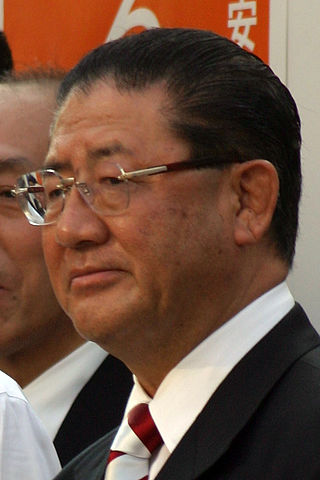
Taku Yamasaki is a retired Japanese politician who served in the House of Representatives from 1972 to 2003 and from 2005 to 2009. He directed the Director General of the Japan Defense Agency for two months in 1989, and served as Minister of Construction from 1991 to 1992. He was a prominent faction leader in the Liberal Democratic Party (LDP) during the late 1990s and early 2000s, and served as its Secretary-General and Vice President under Prime Minister Junichiro Koizumi.
The Japan New Party was a Japanese political party that existed briefly from 1992 to 1994.

Seiji Maehara is a Japanese politician who has been a member of the House of Representatives of Japan since 1993. He founded and led the political party, Free Education for All, before its merger into Nippon Ishin no Kai on 3 October 2024.
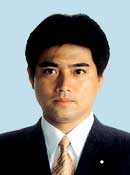
Hisayasu Nagata was a Japanese politician born in Nagoya City in Aichi Prefecture. He was well known for falsely accusing the former Livedoor CEO Takafumi Horie of bribing the Liberal Democratic Party.

Akira Nagatsuma is a Japanese politician of the Constitutional Democratic Party of Japan (CDP), a member of House of Representatives in the Diet. Nagatsuma is currently the deputy leader and the head of the Tokyo chapter of the CDP. He had served as the Minister of Health, Labour and Welfare in the Hatoyama and Kan administration. He came to prominence when he reported missing records of public pension plans. A native of Nerima, Tokyo and graduate of Keio University, he was elected for the first time in 2000 after unsuccessful runs in 1995 and 1996.
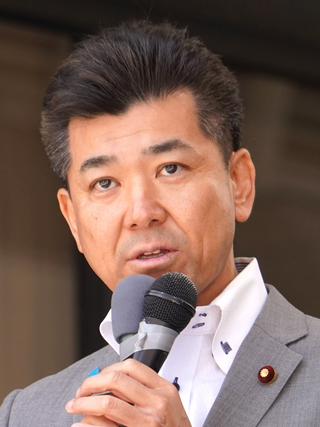
Kenta Izumi is a Japanese politician who served as leader of the Constitutional Democratic Party of Japan (CDP) from 2021 to 2024. He is also a member of the House of Representatives in the National Diet, currently for the Kyoto 3rd district. He was first elected in 2000 under the Democratic Party of Japan. He served as Parliamentary Vice-Minister of the Cabinet Office from 2009 to 2010. After that, he served as chairman of the National Diet Measures Committee and Political Affairs Research Chairman of the Kibō no Tō, the Democratic Party for the People, and the Constitutional Democratic Party of Japan.

Yukio Edano is a Japanese politician who served as the leader of the Constitutional Democratic Party of Japan from its formation in 2017 until 2021.

Junya Ogawa is a Japanese politician of the Constitutional Democratic Party, and a member of the House of Representatives in the Diet. A native of Takamatsu, Kagawa and graduate of the University of Tokyo, he joined the Ministry of Home Affairs in 1994. Leaving the ministry in 2003, he ran unsuccessfully for the House of Representatives in the same year. Two years later, he ran again and lost for a second time. He ran for a third time in 2009 and was elected for Kagawa 1st district.

Keiichiro Asao is a Japanese politician and a member of the House of Councillors in the Diet.

Hisashi Tokunaga is a Japanese politician who is a member of the House of Representatives in the National Diet. A graduate of Waseda University, he was elected to the House of Councillors for the first time in 2007 after serving in the assembly of Shiga Prefecture.

General elections were held in Japan on 22 October 2017. Voting took place in all Representatives constituencies of Japan – 289 single-member districts and eleven proportional blocks – in order to appoint all 465 members of the House of Representatives, the lower house of the then 707-member bicameral National Diet of Japan. Incumbent Prime Minister Shinzō Abe's governing coalition of the Liberal Democratic Party (LDP) and the Komeito party retained their seats in signs of what was perceived as weak opposition. Abe won his fourth term in office and held on to the two-thirds supermajority in order to implement policies on revising the war-renouncing Article 9 of the Japanese Constitution.

Hirofumi Yoshimura is a Japanese politician currently serving as the governor of Osaka Prefecture. He assumed office in April 2019. He has been described as a conservative.
The Democratic Party, was a political party in Japan. It was the largest opposition political party in Japan from 2016 until its marginalization in the House of Representatives in 2017. The party was founded on 27 March 2016 from the merger of the Democratic Party of Japan and the Japan Innovation Party. The majority of the party split on 28 September 2017, before the 2017 general election. Many of its members contesting the election as candidates for the Party of Hope, Constitutional Democratic Party of Japan or as party members without nomination. On 7 May 2018 the DP merged with the Party of Hope to form the Democratic Party For the People.
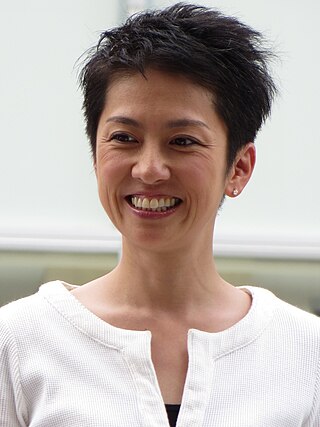
The 2016 Democratic Party leadership election was held on 15 September 2016. It was the party's first election since the formation of the party from the merger of the Democratic Party of Japan and the Japan Innovation Party. The race determined the successor of acting president Katsuya Okada who decided against running for a full term.
Kibō no Tō was a conservative political party in Japan founded by Tokyo Governor Yuriko Koike. The party was founded just before the call of the 2017 general election. The party's ideology was mainly Japanese conservatism and nationalism.
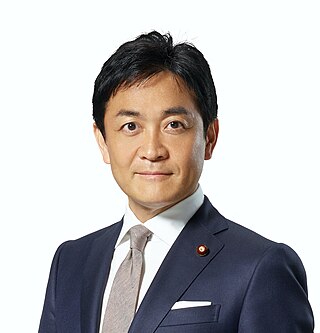
Yuichiro Tamaki is a Japanese politician and the leader of the Democratic Party For the People (DPFP). He is a member of the House of Representatives, and a former leader of Kibō no Tō. Before joining Kibō, Tamaki was a member of the Democratic Party.

The Democratic Party For the People, abbreviated to DPFP or DPP, is a centre to centre-right, conservative and populist political party in Japan. The party was formed on 7 May 2018 from the merger of the Democratic Party and Kibō no Tō. In September 2020, the majority of the party reached an agreement to merge with the Constitutional Democratic Party of Japan and the original party was officially dissolved on 11 September 2020. However, 14 DPFP members refused to merge, including party leader Yuichiro Tamaki, and instead formed a new party retaining the DPFP name and branding.

The 2021 Constitutional Democratic Party of Japan presidential election took place on 30 November 2021 to elect the next president of the Constitutional Democratic Party of Japan after the inaugural leader of the party, Yukio Edano, announced his intention to resign as party leader citing the party's poor performance in the 2021 general election.

Harumi Yoshida is a Japanese politician who currently serves as a member of the House of Representatives for Tokyo's 8th district. She defeated Nobuteru Ishihara in the 2021 Japanese general election. She stood in the 2024 CDP leadership election, where she placed fourth.